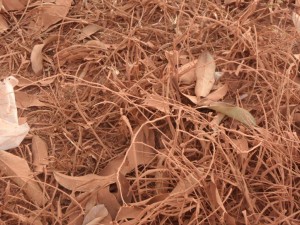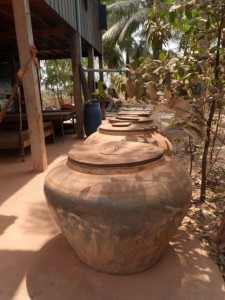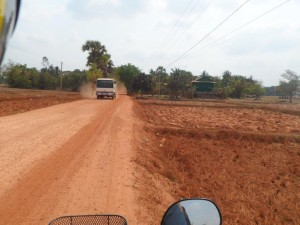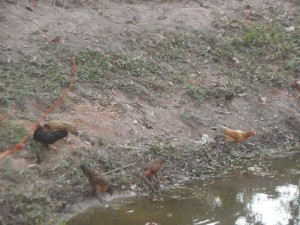Sokha’s description of the yearly struggle for water and the 2014 dry season:
When we first moved to Angkjeay village, we asked our landlord if he had a well. He told as that he had one. As we looked around and couldn’t see one, we asked if he could show us his well. To our surprise, he took us to a pond at the back of his house. We were still puzzled so we asked again if this was the well he was talking about. Since then, we’ve learned that villagers refer to their ponds as “wells”.
Pond water is not only used for bathing, doing the dishes and laundry, it’s also used for drinking and cooking food once the villagers are out of rain water which is usually collected and stored in a row of cement jars by their houses during the rainy season. The collected rain water is not clean though it is better than pond water. The dirt from dirty roofs and dirty pipes go into cement jars. The collected rain water normally lasts for about two to three months starting from November, the end of the rainy season.
Though leading a simple village life is our desire, being healthy is our priority. We want to last long in the village and at the same time set a good example for the villagers to follow. Using pond water was not our option. We once thought of getting pure drinking water from the city and would use the collected rain water to bathe and to do laundry and would try to get a well dug once we were out of rain water. Providentially, we found a Christian pure drinking water company that could deliver pure drinking water to our place and a company that would help us dig a well. After we got a well dug, we were glad to invite the neighbors to use it but they said they were not used to well water. They preferred using pond water or water from the moats in the Buddhist temple instead. Indeed, well water has a lot of minerals, thus, it cannot be used to drink or cook food, but still it can be used to bathe, to do laundry or for washing the dishes and vegetables.
March, April and May, are famous for their heat. They are the hottest months of the year. Both locals and expatriates complain of its extreme temperature and try to stay in shades as much as possible or even wish to get out of the country. In addition, blackouts which last about four to twelve hours a day are common in Phnom Penh and just as common in the village. I guess it is worse here in the village. Since most ponds and even the larger pond in the Buddhist temple are dried up due to the extreme heat and drought, the villagers are running around in search of pond water to bring home to drink and to cook food. Several hours each day are spent finding water and hauling it a few liters at a time back to one’s house. Most of the remaining pond water is green or yellow in color. Although more wells have been dug by NGOs such as Red Cross and UNICEF, there are villagers whose houses are far from those wells. For instance Orm Sorn and Neakming Saron, two of our church members, are suffering from water shortage as there are no wells in their neighborhood. Searching and getting water to use or bathe would take at least half a day.
This season is not only famous for heat; it is also famous for weddings. There are weddings every day everywhere. Nothing can stop people from getting married…ha. Weddings in the village usually last for two days and two nights with loud music. So far we have been invited to at least ten weddings and there have been several near our house. We cannot reject the invitations because it would be an insult even though we know the kind of water that is used to prepare the wedding feast…ha.
From mid-December until April, 1st, there was no rain in our village. On April, 1st an afternoon rain ended the drought.





